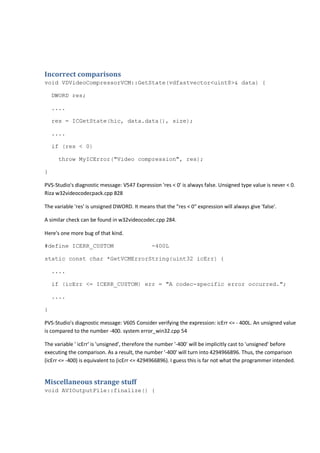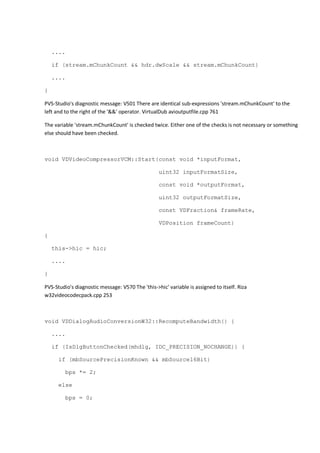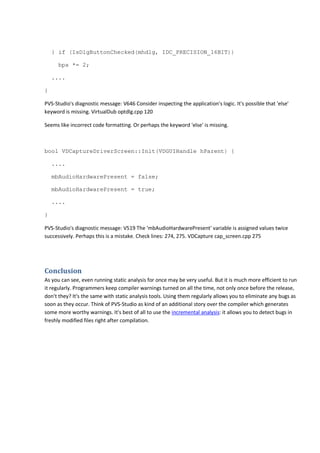The document discusses a static code analysis performed on the VirtualDub project using PVS-Studio to identify various code issues, including violations of best practices, undefined behaviors, and potential bugs. Key issues identified include missing virtual destructors in polymorphic classes, incorrect handling of pointers before null checks, and misuse of magic numbers in string operations. The author highlights the importance of regular code analysis for enhancing software reliability and encourages developers to verify findings independently.
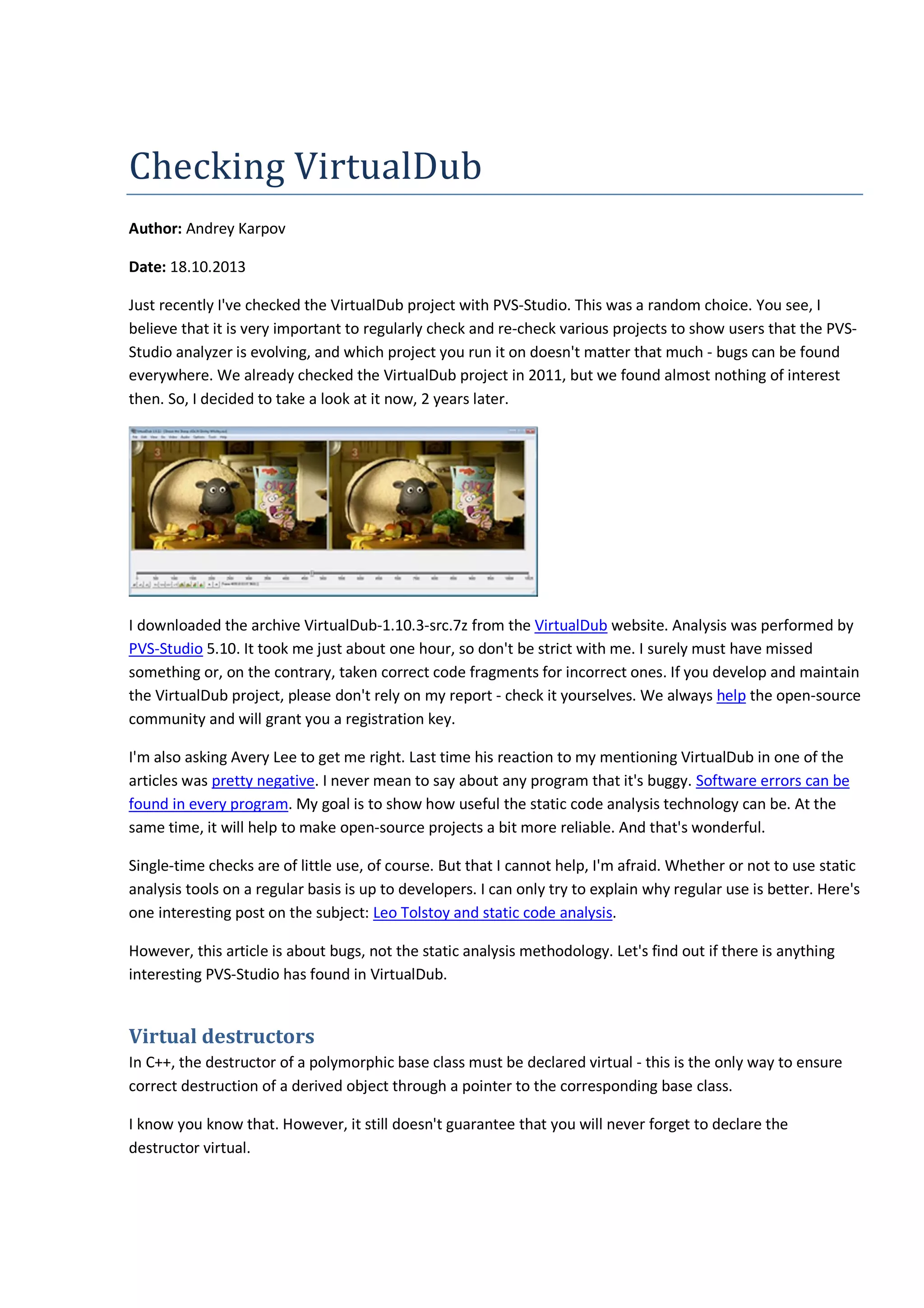
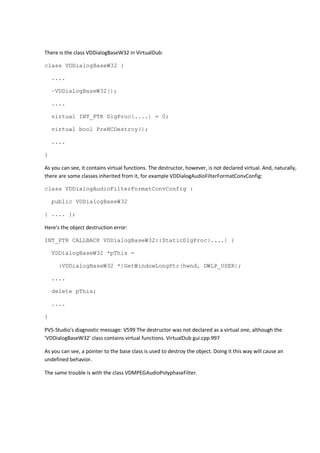
![A bit more about the undefined behavior
It's all clear with bugs related to virtual destructors. Shift operations, however, is a more subtle subject.
Take a look at the following example:
void AVIVideoGIFOutputStream::write(....) {
{
....
for(int i=0; i<palsize; ++i)
dict[i].mPrevAndLastChar = (-1 << 16) + i;
....
}
However hard one may try to convince me that this is an absolutely safe code which has been working for a
dozen years, I'll keep saying that we are still having an undefined behavior here. Let's see what the standard
has to say about such constructs:
The shift operators << and >> group left-to-right.
shift-expression << additive-expression
shift-expression >> additive-expression
The operands shall be of integral or unscoped enumeration type and integral promotions are performed.
1. The type of the result is that of the promoted left operand. The behavior is undefined if the right operand
is negative, or greater than or equal to the length in bits of the promoted left operand.
2. The value of E1 << E2 is E1 left-shifted E2 bit positions; vacated bits are zero-filled. If E1 has an unsigned
type, the value of the result is E1 * 2^E2, reduced modulo one more than the maximum value representable
in the result type. Otherwise, if E1 has a signed type and non-negative value, and E1*2^E2 is representable
in the result type, then that is the resulting value; otherwise, the behavior is undefined.
3. The value of E1 >> E2 is E1 right-shifted E2 bit positions. If E1 has an unsigned type or if E1 has a signed
type and a non-negative value, the value of the result is the integral part of the quotient of E1/2^E2. If E1
has a signed type and a negative value, the resulting value is implementation-defined.
That the code works correctly is sheer luck, and it may suddenly change its behavior once you have
switched over to a new compiler or started using compiler switches for optimization. See the article "Wade
not in unknown waters. Part three" for more information about shift operations and code fixing in such
cases.
Here's the list of fragments of VirtualDub where PVS-Studio has detected Undefined behavior or
Unspecified behavior.](https://image.slidesharecdn.com/0220checkingvirtualdub-141124034105-conversion-gate02/85/Checking-VirtualDub-3-320.jpg)
![Misprints
static ModuleInfo *CrashGetModules(void *&ptr) {
....
while(*pszHeap++);
if (pszHeap[-1]=='.')
period = pszHeap-1;
....
}
PVS-Studio's diagnostic message: V529 Odd semicolon ';' after 'while' operator. VirtualDub crash.cpp 462
Note the semicolon after 'while'. It's either a mistake or incorrect code formatting. It seems more like the
first thing. The loop "while(*pszHeap++);" will reach the end of the line and result in the 'pszHeap' variable
pointing to the memory area after the terminal null. The check "if (pszHeap[-1]=='.')" is meaningless: it's the
terminal null which is always found at "pszHeap[-1]".
Here's another misprint when handling strings.
void VDBackfaceService::Execute(...., char *s) {
....
if (*s == '"') {
while(*s && *s != '"')
++s;
} else {
....
}
PVS-Studio's diagnostic message: V637 Two opposite conditions were encountered. The second condition is
always false. Check lines: 183, 184. VirtualDub backface.cpp 183
This code must skip everything enclosed in the quotes. At least, it seems to do so. However, the condition
(*s && *s != '"') is false right away. Perhaps the code should look like this:
if (*s == '"') {
++s;
while(*s && *s != '"')
++s;](https://image.slidesharecdn.com/0220checkingvirtualdub-141124034105-conversion-gate02/85/Checking-VirtualDub-4-320.jpg)
![}
The new operator throws exceptions when a memory allocation error
occurs
In old code you can often see checks of values returned by the new operator:
int *p = new int[10];
if (!p)
return false;
Contemporary C++ compilers conforming to the C++ standard must throw an exception when memory
cannot be allocated. You can set the 'new' operator not to do this, but this is outside the scope of our article
now.
Therefore, the check if (!p) is not necessary. This code is safe in general - just an odd check, that's all.
But old code fragments may do you much harm, too. Take a look at the fragment from VirtualDub below.
void HexEditor::Find(HWND hwndParent) {
....
int *next = new int[nFindLength+1];
char *searchbuffer = new char[65536];
char *revstring = new char[nFindLength];
....
if (!next || !searchbuffer || !revstring) {
delete[] next;
delete[] searchbuffer;
delete[] revstring;
return;
}
....
}
PVS-Studio's diagnostic message: V668 There is no sense in testing the 'next' pointer against null, as the
memory was allocated using the 'new' operator. The exception will be generated in the case of memory
allocation error. VirtualDub hexviewer.cpp 2012](https://image.slidesharecdn.com/0220checkingvirtualdub-141124034105-conversion-gate02/85/Checking-VirtualDub-5-320.jpg)
![If an exception is thrown in the line "char *revstring = new char[nFindLength];", a memory leak will occur.
The delete[] operators won't be called. This is not a critical error, but it is worth mentioning.
See the list of all the fragments of VirtualDub where a pointer is checked after calling the 'new' operator.
A reference to a destroyed object
vdlist_iterator& operator--(int) {
vdlist_iterator tmp(*this);
mp = mp->mListNodePrev;
return tmp;
}
PVS-Studio's diagnostic message: V558 Function returns the reference to temporary local object: tmp.
VirtualDub vdstl.h 460
The function is implemented incorrectly: it returns a reference to the local object 'tmp'. After leaving the
function, this object will have been destroyed already; handling that reference will cause an undefined
behavior.
By the way, the ++ operator, standing nearby, is implemented correctly.
First use, then check
In various programs you can often see a bug when a pointer is first dereferenced and only then is checked
for being NULL. These errors may stay hidden for a very long time because a pointer being null is a rare
accident. VirtualDub also has a few of these. For example:
void VDTContextD3D9::Shutdown() {
....
mpData->mFenceManager.Shutdown();
....
if (mpData) {
if (mpData->mhmodD3D9)
FreeLibrary(mpData->mhmodD3D9);
....
}](https://image.slidesharecdn.com/0220checkingvirtualdub-141124034105-conversion-gate02/85/Checking-VirtualDub-6-320.jpg)
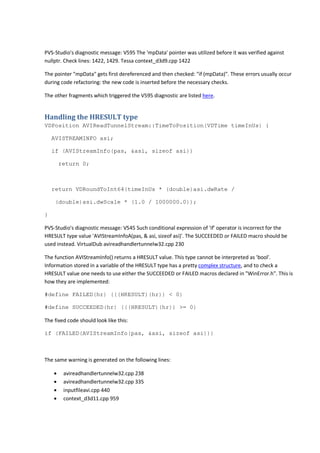
![Magic numbers
It's not a good idea to declare a string length as a number. You may easily make a mistaken when counting
the characters. For example:
bool VDOpenGLBinding::Attach(....) {
....
if (!memcmp(start, "GL_EXT_blend_subtract", 20))
....
}
PVS-Studio's diagnostic message: V512 A call of the 'memcmp' function will lead to underflow of the buffer
'"GL_EXT_blend_subtract"'. Riza opengl.cpp 393
The length of the string "GL_EXT_blend_subtract" is 21 characters, not 20. This error is not critical; no
troubles usually occur in practice. But you'd still better avoid such magic numbers and rather use a special
macro to count the string length. For example:
#define LiteralStrLen(S) (sizeof(S) / sizeof(S[0]) - 1)
C++ allows you to create a template function which is safer:
template <typename T, size_t N>
char (&ArraySizeHelper(T (&array)[N]))[N];
template <typename T, size_t N>
size_t LiteralStrLen(T (&array)[N]) {
return sizeof(ArraySizeHelper(array)) - 1;
}
The advantage of the second method is that it doesn't allow you to accidentally pass a plain pointer as an
argument. This method is described in detail in the article "PVS-Studio vs Chromium".
Absolute paths
VDDbgHelpDynamicLoaderW32::VDDbgHelpDynamicLoaderW32()
{
hmodDbgHelp = LoadLibrary(
"c:program filesdebugging tools for windowsdbghelp");](https://image.slidesharecdn.com/0220checkingvirtualdub-141124034105-conversion-gate02/85/Checking-VirtualDub-8-320.jpg)
![if (!hmodDbgHelp) {
hmodDbgHelp = LoadLibrary("c:program files (x86)......
....
}
PVS-Studio's diagnostic message: V631 Consider inspecting the 'LoadLibraryA' function call. Defining an
absolute path to the file or directory is considered a poor style. VirtualDub leaks.cpp 67, 69
I guess you understand what is bad about this code. It has to do with debugging of course and doesn't seem
to affect the end users in any way, but it's still better to get a correct path to Program Files.
An incorrect argument
sint64 rva;
void tool_lookup(....) {
....
printf("%08I64x %s + %x [%s:%d]n",
addr, sym->name, addr-sym->rva, fn, line);
....
}
PVS-Studio's diagnostic message: V576 Incorrect format. Consider checking the fourth actual argument of
the 'printf' function. The argument is expected to be not greater than 32-bit. Asuka lookup.cpp 56
The variable 'rva' is a 64-bit type, which means that it will write 8 bytes into the stack. The function printf()
is a variadic function. The data type it must process is specified by the format string. In our case, the 'rva'
variable will be processed as a 32-bit variable ("%x").
Whether or not this error will cause any faults depends on how in particular the compiler will be passing the
arguments and on the platform bitness. For example, all the integer types in Win64 are first cast to a 64-bit
type and only then are written into the stack, so there'll be no trouble with a variable occupying more stack
memory than necessary.
However, if the variable 'rva' stores values bigger than INT_MAX, its value will be incorrectly printed
anyway.
The same warning is generated for the following fragments:
• dubstatus.cpp 360
• lookup.cpp 58](https://image.slidesharecdn.com/0220checkingvirtualdub-141124034105-conversion-gate02/85/Checking-VirtualDub-9-320.jpg)
